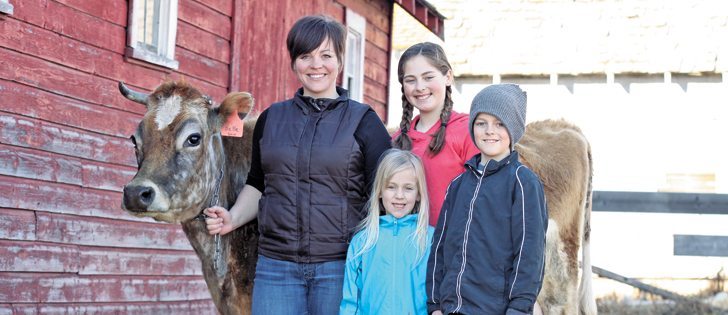Surviving off the land has sparked panic from not knowing if the food will last, and satisfaction in learning how to make do with less
VIKING, Alta. — Are we as tough and resourceful as our pioneer ancestors?
It’s a question farmers Danny and Shannon Ruzicka asked. After six months of eating like pioneers, they know they aren’t even close.
“What sucks we are today,” said Shannon Ruzicka, whose family launched a yearlong quest of buying nothing, including food.
Instead, the family of five is living off the food they grow in their garden, forage in the field, raise in their pasture or trade with others who grow it.
Read Also

New coal mine proposal met with old concerns
A smaller version of the previously rejected Grassy Mountain coal mine project in Crowsnest Pass is back on the table, and the Livingstone Landowners Group continues to voice concerns about the environmental risks.
They do have some exceptions. They buy sugar and salt and anything required for business and hygiene.
The family isn’t taking itself away from the modern world. Her husband continues to work as a farrier, they still drive their kids to skating and choir, run their farm and business supplying food to restaurants, live in a modern house and home school their children.
However, they have taken a small step to living like their pioneer ancestors.
“We are only doing one snippet of what our ancestors did,” Ruzicka said. “I enjoy being able to switch on the light and have running water. I’m not pioneer-tough yet.”
The seed for the project was sown when Ruzicka read her great-grandfather’s biography. He walked from Germany to Russia, emigrated to Manitoba with little money and created a farm out of the northern Manitoba bush.
To make extra money, he would work in a logging camp for months and leave his wife and children at home.
“They carved a life for themselves,” said Ruzicka, who started wondering if they could copy a bit of what their ancestors did after reading the biography.
Thinking about her pioneer ancestors helped Ruzicka as she laboured in the long rows of the garden as she pulled the weeds and hoped for enough food for the winter.
The money they saved by not buying groceries or stopping for a quick bite at a fast food restaurant before sports or while in town has also buoyed the family.
“It’s become addicting,” she said.
Ruzicka hopes they will keep saving after their project ends in mid August and learn from their frugal ways.
“If we could continue on not buying, we could pay the farm off sooner. It’s fun. It keeps you going.”
Living without spending money has its challenges and requires planning.
Trips to town with the children mean packing a lunch or snacks. Danny packs lunches when on the road with his farrier business in-stead of stopping to eat.
The family hosts a dinner in the field each year on their Nature’s Green Acres farm. Chefs from the Rge Rd restaurant in Edmonton create a multicourse dinner with food grown and foraged from the farm.
Ruzicka underestimated how many carrots would be used in the 80-person meal, and the family ate the last of their carrots in February.
They are still eating beans, peas, tomatoes and other garden vegetables that were preserved in their freezer and root cellar.
The family did go without eggs for several weeks this winter when the chickens began to molt and quit laying.
However, the longer daylight has prompted the chickens to once again lay eggs, and the family is delighted to have eggs back in their diet.
Ruzicka was asked this winter to paint backdrops for her children’s skating carnival. Instead of interrupting her painting to milk the cow, she sent the kids out to do it. However, she eventually had to step in after four days without milk because the cow kept stepping in the milk pail.
Ruzicka doesn’t use baking powder, baking soda or yeast and has been forced to make bread without the leavening agents.
She’s given up on sourdough bread for a while after killing her starter several times.
She’s also learned to make simple cheese without the aid of store-bought bacteria and cultures. She accidently made sour cream, and potato wedges and sour cream are now a family snack.
“All these foods, I’m amazed with the flavours, but they can’t be repeated. Every day is a new adventure of what you’re going to be making and eating.”
Through a fortunate accident, Ruzicka discovered clabber, a yogurt-like byproduct of milk.
Mixing clabber, flour, sugar and salt makes a type of flat bread that can be used for lunches. Add more sugar and it becomes pancakes or waffles, while adding rhubarb or saskatoons turns the clabber mixture into muffins.
“You have to play with things and figure it out.”
The initiative has taught the family about the cycle of life on the Prairies. They eat fresh picked lettuce in the summer but not the winter.
They’re also looking forward to the snow melt and discovering newly sprouted plants.
“I’m looking forward to weeds again.”
She has also learned to monitor the root cellar closely to stop chipped or rotten potatoes from spreading rot throughout the cellar.
“I panicked. I didn’t know if we would have enough food.”
Looking back at six months of raising and making their own food, Ruzicka wonders if she’s looking more toward the future than back to her ancestors.
“I wonder if this is more about the future of food.”

















